In today's fast-paced digital world, showcasing your digital skills in a cover letter is more important than ever. Employers are not just looking for traditional qualifications; they want to see how adept you are at navigating the complexities of technology. By effectively highlighting your digital expertise, you can demonstrate your value and adaptability in the workplace. Curious about how to craft the perfect letter? Read on for tips and insights!

Highlight Relevant Digital Skills
In today's competitive job market, possessing relevant digital skills is essential for career advancement. Proficiency in software programs such as Adobe Creative Suite, which includes Photoshop and Illustrator, allows for high-quality graphic design work, crucial in marketing roles. Familiarity with data analysis tools like Microsoft Excel (particularly pivot tables and VLOOKUP functions) enhances the ability to interpret complex datasets, especially in finance or research fields. Understanding programming languages such as Python or JavaScript offers a significant advantage in tech-related industries, enabling automation of tasks and development of web applications. Moreover, experience with content management systems like WordPress can facilitate effective website management, important for digital marketing strategies. Mastery of social media platforms--Facebook, LinkedIn, and Twitter--coupled with analytical tools like Google Analytics, creates a strong foundation for driving engagement and measuring campaign success in any organization.
Showcase Achievements Using Digital Tools
Leveraging digital tools, such as Google Analytics for website tracking and Sprout Social for social media management, professionals can highlight significant achievements in their careers. For instance, a marketing manager might showcase a 40% increase in website traffic over six months by utilizing SEO strategies and content marketing tactics. Similarly, using platforms like Salesforce, a sales representative could demonstrate a 30% boost in quarterly sales through effective CRM (Customer Relationship Management) practices. Furthermore, design software such as Adobe Creative Suite can be instrumental in creating compelling visuals, with one graphic designer noting a 50% rise in client engagement after implementing innovative branding strategies. Such quantifiable results exemplify how proficiency in digital tools leads to measurable success in various fields.
Align Skills with Job Description
Digital skills play a crucial role in modern job markets, enabling tasks such as data analysis, social media management, and software development. Proficiency in tools like Microsoft Excel can streamline data management, while knowledge of programming languages such as Python and JavaScript enhances coding capabilities. Familiarity with digital marketing strategies, including SEO (Search Engine Optimization) and PPC (Pay-Per-Click advertising), can significantly boost a company's online presence. Furthermore, expertise in collaboration platforms like Slack or Microsoft Teams fosters efficient communication, essential for remote work environments. Highlighting these digital skills in relation to specific job descriptions ensures alignment with employer expectations and showcases readiness to contribute to organizational goals.
Use Industry-Specific Keywords
Digital skills are crucial in today's technology-driven landscape, particularly in industries such as information technology, marketing, and finance. Proficiency with software tools, such as Adobe Creative Suite for design or Salesforce for customer relationship management, enhances productivity and collaboration. Additionally, expertise in data analysis using platforms like Excel or Tableau is vital for making informed decisions. Familiarity with programming languages, such as Python and Java, augments one's ability to develop applications and automate processes effectively. Understanding digital marketing techniques--including search engine optimization (SEO) and social media analytics--allows for increased engagement and outreach in the online marketplace. These skills not only promote efficiency but also enable businesses to remain competitive in a rapidly evolving digital economy.
Demonstrate Continuous Learning and Adaptability
In today's fast-paced digital landscape, continuous learning and adaptability are crucial for success in various fields, especially in technology-driven environments. The rapid evolution of software tools, coding languages, and online platforms requires professionals to stay updated with the latest trends, innovations, and best practices. For instance, mastering platforms like Microsoft Azure or Google Cloud (with millions of users) enhances one's ability to contribute effectively to projects. Attending workshops and enrolling in online courses on platforms such as Coursera or Udemy fosters growth, enabling individuals to acquire new skills and certifications that align with evolving industry demands. Moreover, participating in industry conferences such as CES (Consumer Electronics Show) provides invaluable networking opportunities and insights into emerging technologies. Demonstrating a commitment to lifelong learning not only enhances personal agility in adapting to new challenges but also significantly boosts employability in a competitive job market.
Letter Template For Emphasizing Digital Skills Cover Letter Samples
Letter template of a cover letter highlighting digital proficiency for job application.
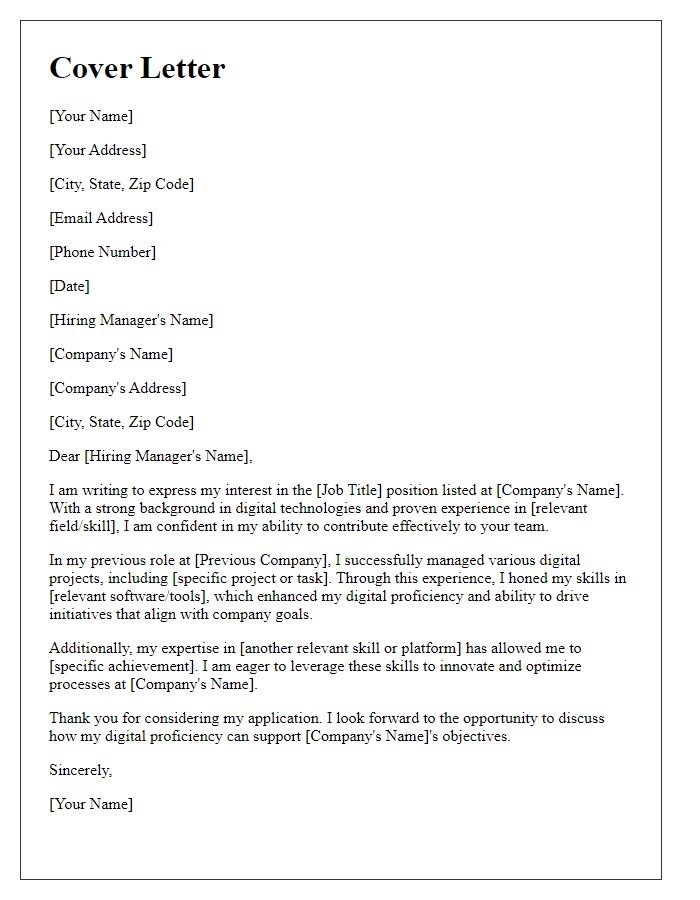
Letter template of a cover letter emphasizing tech-savvy qualifications for employment.

Letter template of a digital skills-focused cover letter for a creative position.
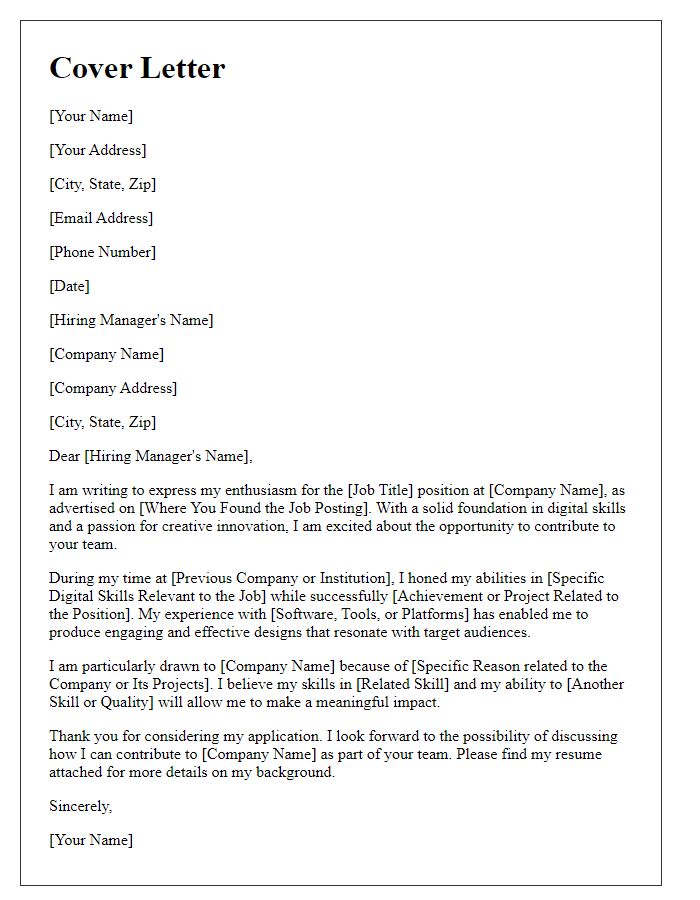
Letter template of a cover letter showcasing IT skills for a tech-related job.
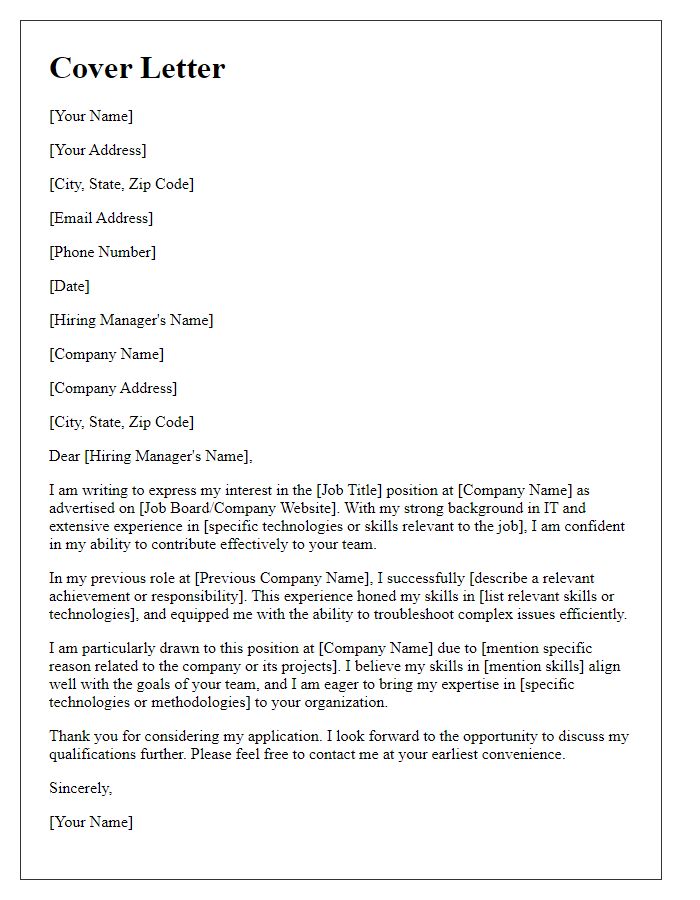
Letter template of a cover letter underlining digital expertise for a marketing role.
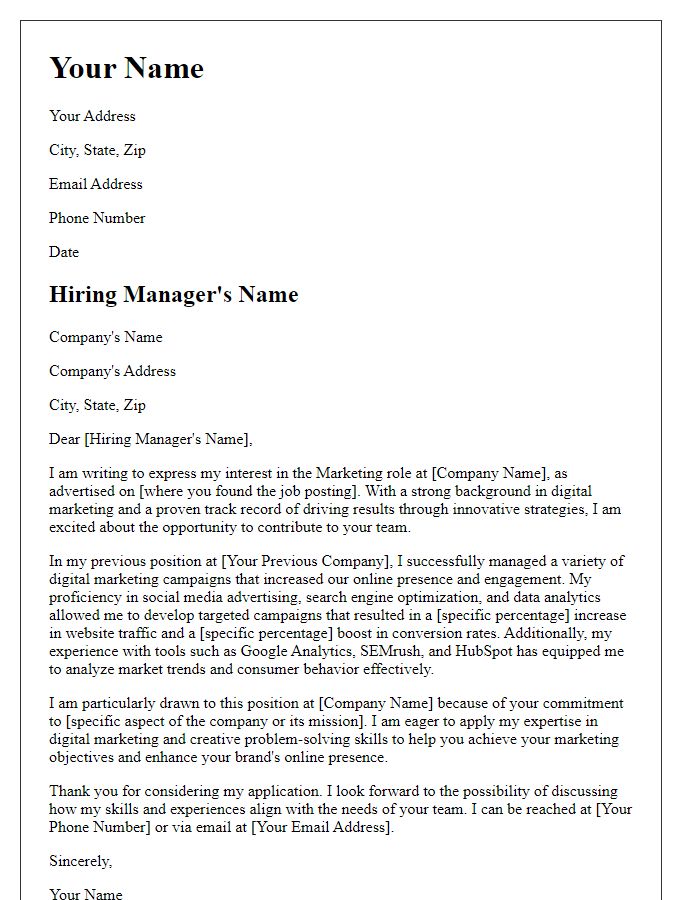
Letter template of a cover letter accentuating online communication capabilities.
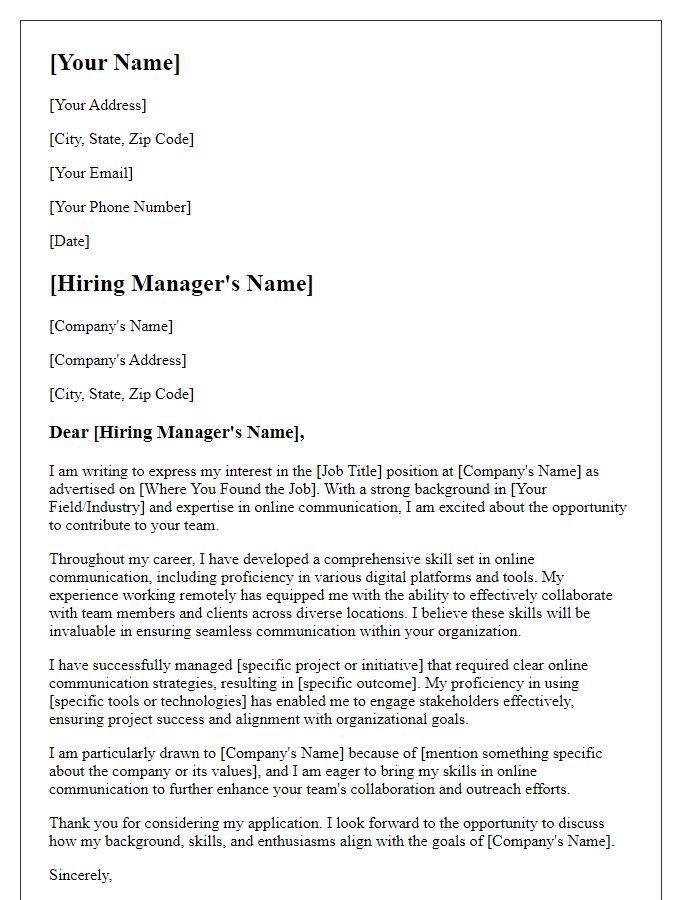
Letter template of a cover letter reflecting digital literacy for administrative positions.
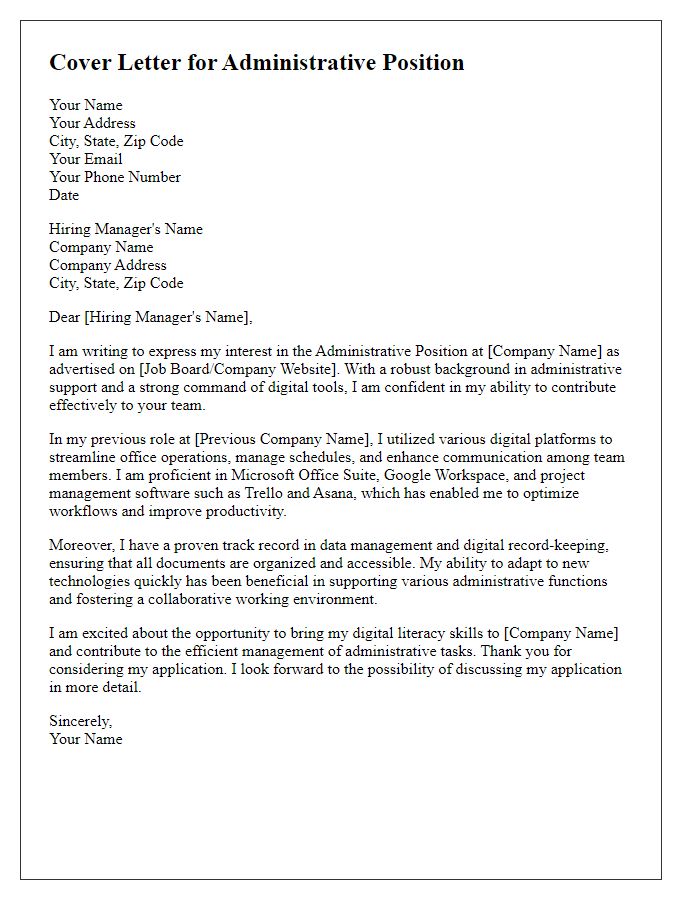
Letter template of a cover letter stressing digital project management skills.
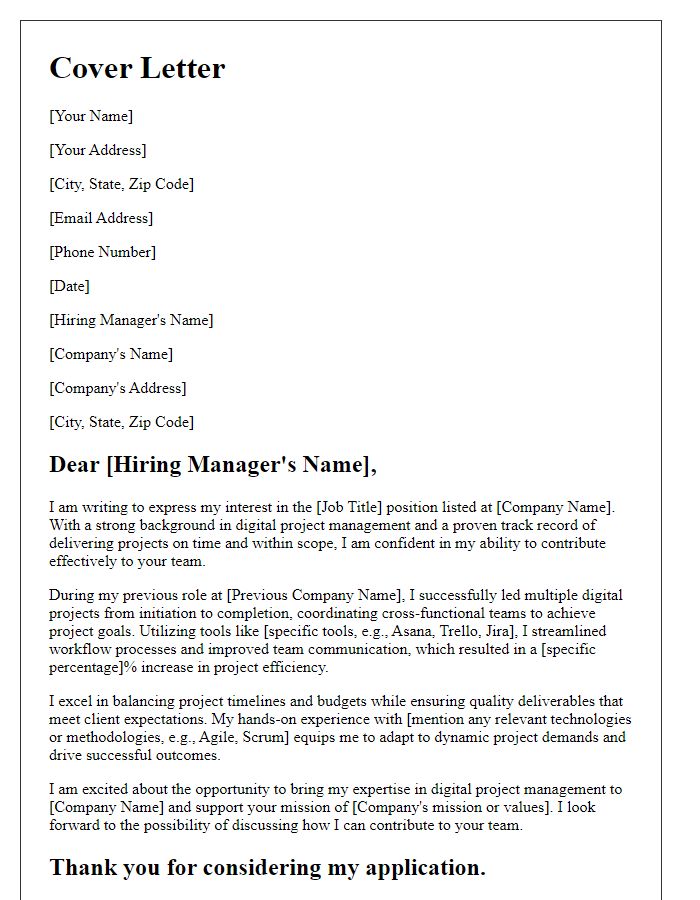
Letter template of a cover letter highlighting e-commerce know-how for a business role.
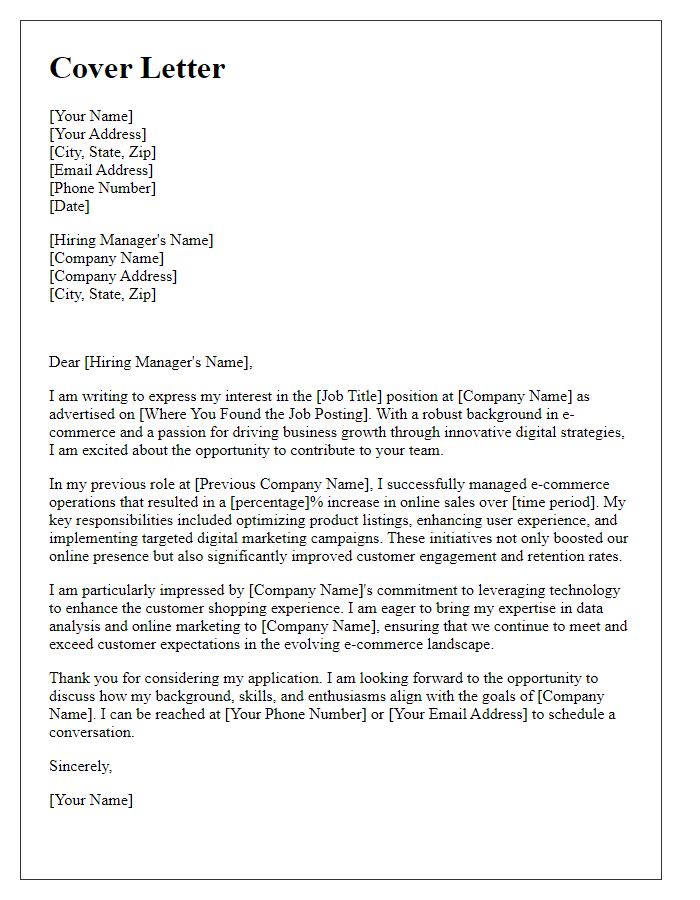

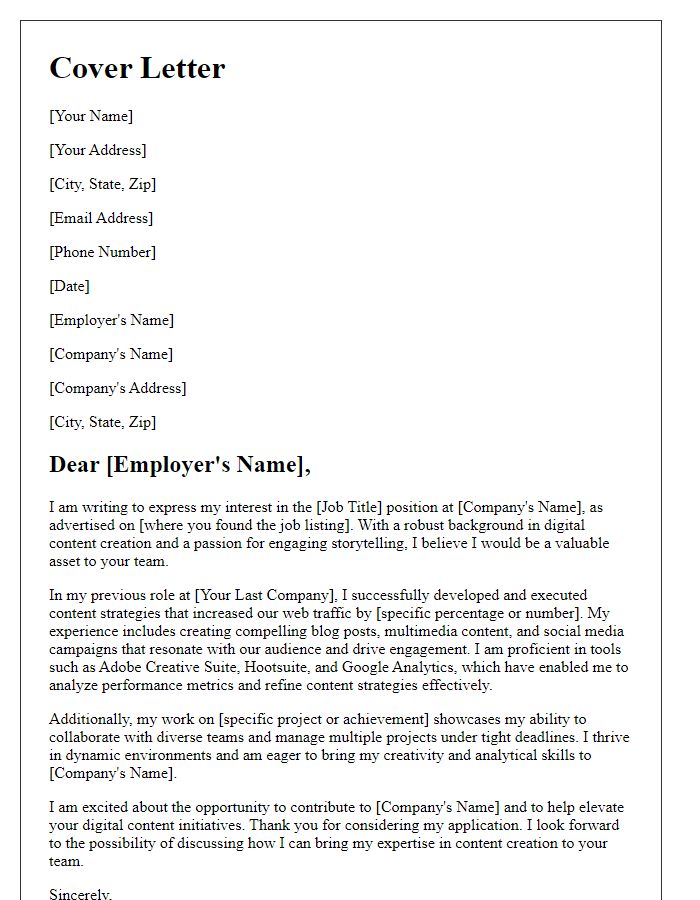


Comments